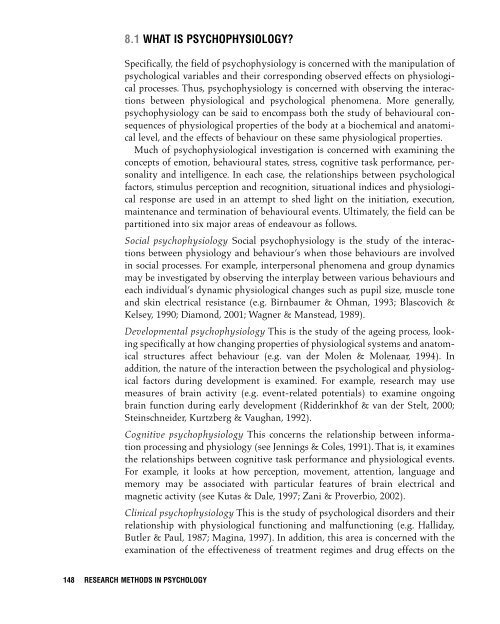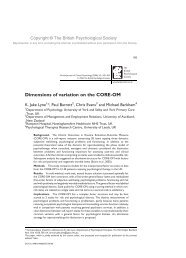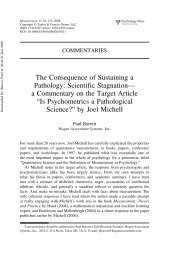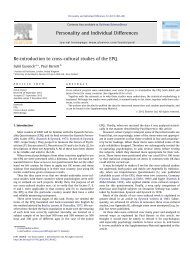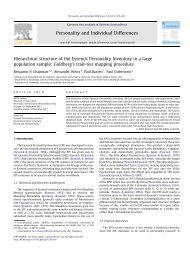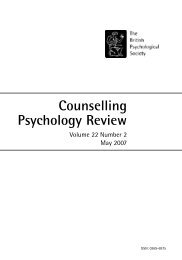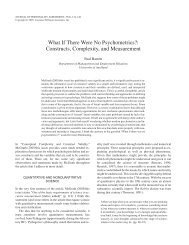Psychophysiological Methods - Paul Barrett
Psychophysiological Methods - Paul Barrett
Psychophysiological Methods - Paul Barrett
- No tags were found...
Create successful ePaper yourself
Turn your PDF publications into a flip-book with our unique Google optimized e-Paper software.
Breakwell-3389-Ch-08.qxd 2/7/2006 8:49 PM Page 1488.1 WHAT IS PSYCHOPHYSIOLOGY?Specifically, the field of psychophysiology is concerned with the manipulation ofpsychological variables and their corresponding observed effects on physiologicalprocesses. Thus, psychophysiology is concerned with observing the interactionsbetween physiological and psychological phenomena. More generally,psychophysiology can be said to encompass both the study of behavioural consequencesof physiological properties of the body at a biochemical and anatomicallevel, and the effects of behaviour on these same physiological properties.Much of psychophysiological investigation is concerned with examining theconcepts of emotion, behavioural states, stress, cognitive task performance, personalityand intelligence. In each case, the relationships between psychologicalfactors, stimulus perception and recognition, situational indices and physiologicalresponse are used in an attempt to shed light on the initiation, execution,maintenance and termination of behavioural events. Ultimately, the field can bepartitioned into six major areas of endeavour as follows.Social psychophysiology Social psychophysiology is the study of the interactionsbetween physiology and behaviour’s when those behaviours are involvedin social processes. For example, interpersonal phenomena and group dynamicsmay be investigated by observing the interplay between various behaviours andeach individual’s dynamic physiological changes such as pupil size, muscle toneand skin electrical resistance (e.g. Birnbaumer & Ohman, 1993; Blascovich &Kelsey, 1990; Diamond, 2001; Wagner & Manstead, 1989).Developmental psychophysiology This is the study of the ageing process, lookingspecifically at how changing properties of physiological systems and anatomicalstructures affect behaviour (e.g. van der Molen & Molenaar, 1994). Inaddition, the nature of the interaction between the psychological and physiologicalfactors during development is examined. For example, research may usemeasures of brain activity (e.g. event-related potentials) to examine ongoingbrain function during early development (Ridderinkhof & van der Stelt, 2000;Steinschneider, Kurtzberg & Vaughan, 1992).Cognitive psychophysiology This concerns the relationship between informationprocessing and physiology (see Jennings & Coles, 1991). That is, it examinesthe relationships between cognitive task performance and physiological events.For example, it looks at how perception, movement, attention, language andmemory may be associated with particular features of brain electrical andmagnetic activity (see Kutas & Dale, 1997; Zani & Proverbio, 2002).Clinical psychophysiology This is the study of psychological disorders and theirrelationship with physiological functioning and malfunctioning (e.g. Halliday,Butler & <strong>Paul</strong>, 1987; Magina, 1997). In addition, this area is concerned with theexamination of the effectiveness of treatment regimes and drug effects on the148 RESEARCH METHODS IN PSYCHOLOGY


